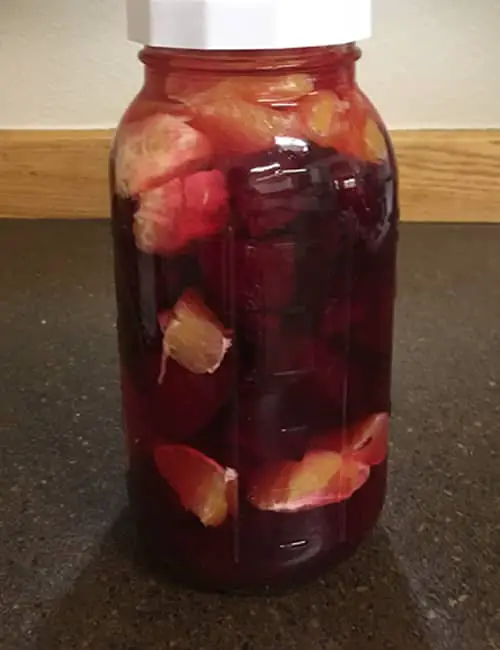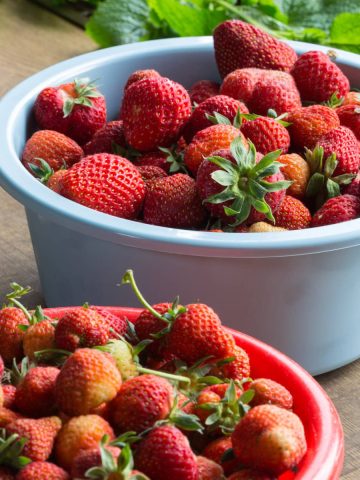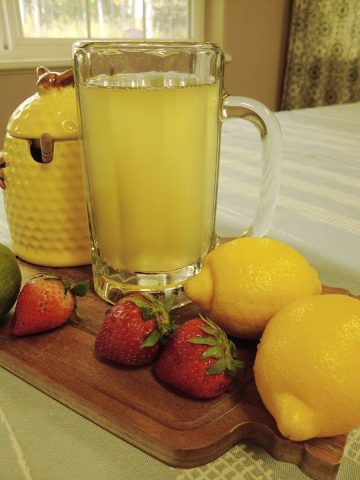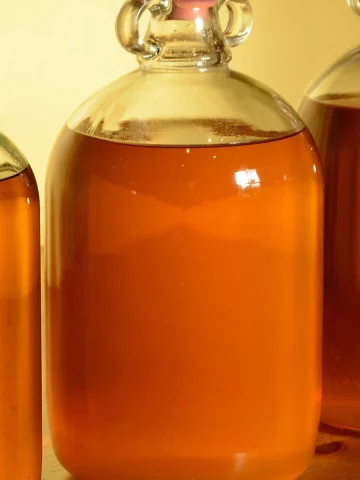How To Make Beet Kvass
Simply delicious and nutritious, beet kvass is a fermented drink made from beets, salt, and water. Try this easy step-by-step beet kvass recipe.
If you have made sauerkraut or kimchi, this beet kvass recipe will be a piece of cake to master.
The secret to making beet kvass into a drink you will want to drink lies in the fruits you add to the recipe. The sweetness of oranges, apples, strawberries, and/or ginger gives it a sweeter flavor that reduces the earthy, sometimes dusty flavor beets are known for.
Beet kvass is a gut-healthy drink that promotes regularity, aids digestion, alkalizes the blood, and cleanses the liver. With benefits like that, isn’t it worth trying various recipes to find one you enjoy?
Related Topic: Best Books on Gut Health
Health Benefits of Kvass: A Nutritional Powerhouse
Regarding functional foods that offer an impressive array of health benefits, kvass stands tall among the crowd. This ancient elixir has gained recognition not only for its rich flavor but also for its numerous nutritional advantages. This comprehensive guide delves into kvass, exploring its nutritional facts and the myriad ways it can enhance your well-being.
Nutrition Facts
Kvass, often called "functional food," is celebrated for its diverse probiotics and essential nutrients. Its nutritional highlights include vitamin B12, selenium, and manganese, which play pivotal roles in maintaining our health. Furthermore, if prepared with beets, kvass becomes an even more potent source of well-being. It boasts a generous dose of antioxidants, natural nitrates, and vitamins A and C, all of which contribute to its nutritional prowess.
Let's break down the nutritional profile of a four-ounce serving of beet kvass, as per data from the U.S. Department of Agriculture:
- Calories: 35
- Carbohydrates: 8 grams
- Protein: 1 gram
- Fiber: 2 grams
- Vitamin A: 6,500 international units (130 percent DV)
- Vitamin C: 4.8 milligrams (8 percent DV)
- Iron: 0.4 milligrams (2 percent DV)
- Calcium: 20 milligrams (2 percent DV)
Please note that these values may vary slightly depending on the specific ingredients used in the kvass preparation. Now, let's delve deeper into the remarkable benefits of this age-old elixir. (1)
Great Source of Probiotics
Kvass's claim to fame lies in its probiotic content, making it a champion in promoting intestinal tract health and bolstering the immune system. Probiotics enhance nutrient absorption within the body and increase gut microflora diversity. Moreover, they may even exhibit appetite-reducing effects.
Earlier, our diets teemed with probiotics from wholesome, soil-grown produce and traditional food fermentation practices. Sadly, modern agricultural methods, refrigeration, and food processing have significantly reduced our intake of probiotic-rich foods.
This probiotic deficiency can lead to various health issues, including digestive disorders, skin ailments, candida overgrowth, autoimmune conditions, and frequent infections.
Excellent Liver Cleanser
Contrary to popular belief, liver health isn't solely determined by alcohol consumption; poor dietary choices can also wreak havoc on this vital organ. Beets, a key ingredient in kvass, offers a treasure trove of antioxidants and potassium. These compounds combat free radicals, mitigating aging and reducing the risk of certain diseases.
Beet kvass, akin to beetroot juice, is pivotal in gallbladder cleansing, improving bile flow, toxin removal, and promoting regular bowel movements. It's a natural ally for a healthier liver.
A Blood Tonic
Beets contain phytonutrients called betalains, which impart their distinctive color to the vegetable. These betalains contribute to the production of red blood cells, rendering beet kvass an exceptional blood tonic with the added benefit of alkalizing the blood.
Maintaining proper blood pH levels is crucial, as excessive acidity can trigger inflammation and calcium depletion. Consuming alkaline-promoting foods like beets and leafy greens, as found in kvass, can help restore this balance.
May Help Reduce the Risk of Cancer
One of the most compelling facets of beet kvass is its potential role in natural cancer prevention. Its potent combination of antioxidants and anti-inflammatory properties positions it as a promising candidate in the fight against cancer.
A source claims that beetroot's therapeutic potential extends to inflammation control, reducing the risk of specific cancer types. (2)
Full of Valuable Nutrients
Beyond its specific health benefits, beet kvass is a nutrient powerhouse. Its high vitamin C content boosts immune function and guards against the common cold. Additionally, it is rich in manganese, vital for healthy bones, and essential for the proper functioning of the liver, kidneys, and pancreas. Folate, another B vitamin found in beet kvass, is pivotal in reducing the risk of birth defects.
In conclusion, kvass, mainly made with beets, emerges as a nutritional gem with various health-enhancing properties. Whether seeking to fortify your immune system, support liver health, or enjoy a delicious and nutritious beverage, kvass deserves a prominent place in your dietary repertoire. Embrace the tradition of this remarkable elixir and unlock the potential it holds for your well-being.
Beet Kvass Recipe
Notes
Sweeten the recipe by adding apples, strawberries, orange juice, carrots, pineapple, mint leaves, or cinnamon.
Salt: When fermenting, always use salt that does not contain iodine or anti-caking agents. Iodine and anti-caking agents can inhibit fermentation.
Water: the chlorine in water can also inhibit fermentation, so use spring, distilled, or filtered water if you can.
Optional starters: To speed up the fermentation process, add a tablespoon or two of whey to the jar or sauerkraut or kimchi juice for the same effect.
Recycle: use the leftover beets and 1 cup of the existing kvass to start another batch of beet kvass. Discard the beets after the second batch.
Ingredients
- 2-3 medium beets, wash, peel, and chopped into 1-inch cubes
- 2 oranges, peeled and chopped
- 1 tablespoon ginger finely chopped
- 4 tsp. sea salt
- 2 quarts filtered water to cover the beets
Instructions
- Peel and chop beets into ½-inch pieces
- Peel and cut orange pieces in half
- Peel and cut about ½ inch of fresh ginger into pieces
- Place the beets, oranges, and ginger in layers in a half-gallon jar.
- Dissolve the salt in filtered water and fill the jar with the mixture, leaving 1-inch headspace.
- Cover the jar with a lid, airlock lid, or paper towel secured with a rubber band.
- If using a lid, be sure to burp daily to release pressure build-up from the carbon dioxide and prevent the jar from breaking.
- Culture at room temperature (60-70°F is preferred) until desired flavor and texture is achieved.
- After 5 days, check the depth of flavor of the kvass—you want the kvass to be slightly sweet, slightly salty, and very earthy.
- When the beet kvass is fermented to your liking, use a sieve to strain the liquid into jars, label it, and store them in the fridge for up to three months.
- Enjoy the beet kvass on its own, or try diluting it with sparkling water.
The salt brine is enough to ferment beet kvass successfully. However, you can use a starter culture if you want a little extra assurance that your recipe will ferment properly. To learn more about using a starter culture, check out this post, is starter culture necessary for making sauerkraut?
What to get all the nutritional benefits of drinking beet juice but don't have the time to make it? Check out my review of the best-fermented beet powders available today.
Now that you've learned how to make beet kvass taste delicious, here are a few more recipes that you might find interesting…
- Sourdough Bread Kvass
- Lacto-Fermented Mushrooms
- Fermented Honey Garlic
- Kombucha 1 Gallon Recipe
- Honey Mead Recipe
- Cultured Cream Cheese Recipe
Resource:
- Kvass: How to Make this Ukrainian Probiotic Drink - Dr. Axe. (2022, December 2). Dr. Axe. https://draxe.com/recipes/kvass/
- Clifford, T., Howatson, G., West, D. J., & Stevenson, E. (2015). The potential benefits of red beetroot supplementation in health and disease. Nutrients, 7(4), 2801–2822. https://doi.org/10.3390/nu7042801






